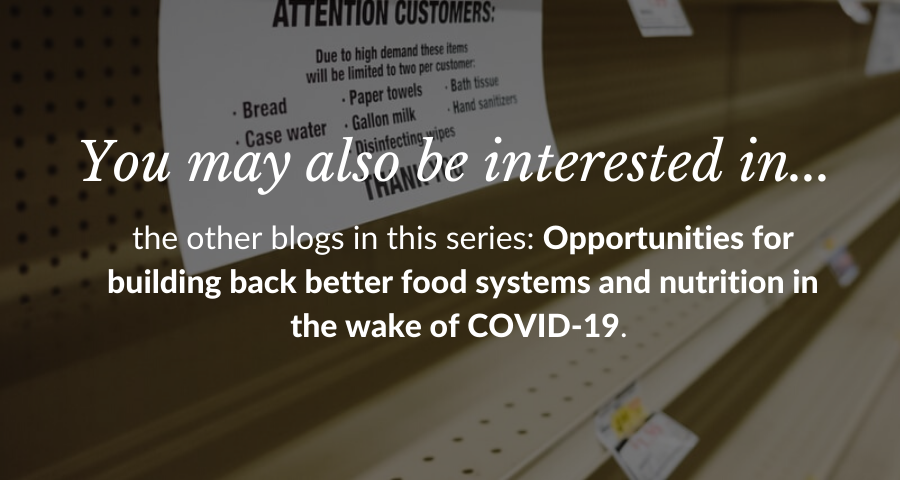With the COVID-19 pandemic and the unique and unforeseen challenges it poses, private sector accountability is more important than ever. The impact of the virus has highlighted the food industry’s crucial role in ensuring that healthy and sustainable food continues to be made affordable and accessible to everyone. Along with the challenges, it is also the start of a unique and urgent opportunity to reorient the food system towards a more healthy, equitable and sustainable future: a chance for the world to build back better.
To ensure that the food industry is well placed to be part of this change, Access to Nutrition Initiative (ATNI) has developed a Framework to identify action (and inaction) by food and beverage manufacturers in response to the crisis. The Framework will add a COVID-19 lens to our existing range of private sector accountability tools and monitoring mechanisms, research, stakeholder consultation or investor engagement – all of which can be used by many other stakeholders to understand the food industry's response in greater depth, highlighting new ways in which companies can take action.
Based on our research so far, we have identified initial areas in which companies can and should take action:
Form a strategic response to the COVID-19 pandemic – both to react to the immediate crisis and to build resilience and sustainability into the future.
This is a huge opportunity to ‘build back better’, to be part of a transformation towards a healthy and sustainable food system. Category A: Governance and Leadership examines the way in which companies develop and implement a nutrition-sensitive strategy, the management systems governing it and the reporting against it. We will produce three more quarterly reports, which we hope will encourage strategic change, going beyond short-term philanthropy, with companies inspired to take the approach set out in the Framework forward.
Support the workforce and supply chain.
Our stakeholder consultations showed us that the health and well-being of the workforce of companies and that of their suppliers and distributors in the food and beverage value chain has become central to business operations in an unprecedented way. One of the initial, short-term immediate responses to the pandemic is efforts to support and protect the workforce, including the provision of PPE and/or financial support. For example, General Mills is offering employees working at manufacturing plants enhanced benefits including daily bonuses, additional paid leave to cover family, health and work situations, and consultations to address childcare concerns. Category E in the Framework concerns protecting employees and promoting healthy lifestyles. It has three sub-categories: employee health and wellbeing, value-chain health and wellbeing, and consumer/community (educational) programs. With the indicators and assessment in this category, we hope to be able to further strengthen the important role companies are already playing in maintaining the movement of safe and nutritious foods along the value chain to reach communities in need.

Ensure that any donations of food or other contributions are healthy, needs-based, developed in consultation with local partners, do not establish inappropriate parallel food systems and (in the case of donations of infant formula) do not breach the International Code of Marketing of Breast-Milk Substitutes.
Donations of food and/or financial support from companies was a widespread theme observed in the earlier stages of the pandemic. For example, our initial research found that Mondelez donated 71 tonnes of biscuits and chocolate to the India FoodBanking Network to distribute in 12 Indian cities. There are widespread concerns about the healthiness of the products being donated and a reference to the use of a nutrient profiling system in deciding on the contents of a donation has not yet been identified. These donations were sometimes specifically being made to populations vulnerable to the virus, which is particularly concerning because unhealthy product donations can actually reinforce underlying inequalities.
Because nutrition within the first 1,000 days of a child’s life is critically important, with breastfeeding as a crucial element, this Framework also focuses on infant and young child nutrition. Concerns have been raised about the safety of breastfeeding during the Coronavirus pandemic, however UNICEF advises that it is safe and highly beneficial if proper hygiene precautions are taken. Our report emphasises that “companies must be particularly assiduous in ensuring that their marketing adheres to the recommendations of the Code and consider doing more to protect breastfeeding during this emergency period beyond normal practices.”
Ensure that the response to COVID-19 does not adversely affect ongoing efforts in areas such as responsible marketing and reformulation towards healthier products.
COVID-19 has prompted new marketing campaigns and advertising by companies: from home activities for children to encouraging 'comfort' eating, there has undoubtedly been a shift in the way companies market their products in response to the pandemic. Our report highlights some examples that have been criticised, for example: "in the UK, Kellogg’s brand Pringles removed advertising on a popular fitness YouTube channel at the end of May after complaints of irresponsible practices on marketing to children." Early signs indicate that there has been an increased reliance on e-commerce and online purchasing as the pandemic has rippled through the world, this underscores the need to address inappropriate marketing online. Category D of the Framework monitors companies in this area and requires that companies will take particular care to ensure that responsible marketing commitments across all markets are upheld or strengthened during the COVID-19 crisis, especially in relation to children.
We will continue to monitor companies’ action and inaction in response to COVID-19. The first of our quarterly reports as part of this project was published on 17 July, and the results of a first assessment of 39 large food companies against the Framework will be published in October. With additional and emerging challenges which put an additional 130 million people at risk of hunger and malnutrition, this is a critical time for food system actors to take action towards positive change for nutrition, and we hope the Framework and forthcoming assessments will be an important way to promote private sector accountability as part of that change.
Inge Kauer is Executive Director of the Executive Director of the Access to Nutrition Initiative. In this role, she oversees all aspects of ATNI, including collaboration with external partners and stakeholders. Next to leading the organisation, she is also member of the board of ATNI. Inge has spent more than 15 years working with public and private sector organisations on major social issues, including nutrition. She has a background in high-level stakeholder management and communications as well as both leading and building professional organizations. She has a passion for bringing together diverse stakeholders to facilitate sustainable improvements for all involved. Read more.

